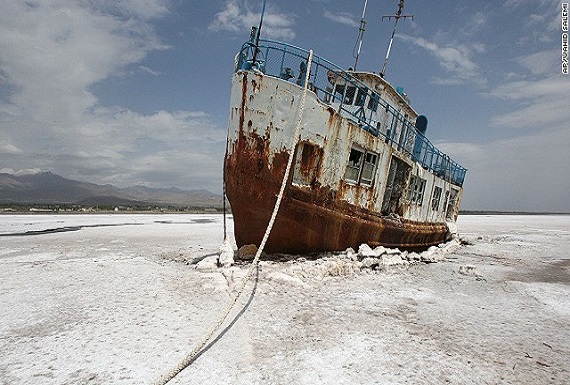Gary Lewis: Lake Urmia Will Not Return To Its Glory Days But Partly Can Be Recovered

Araz News: The UN Resident Coordinator in Iran Mr. Gary Lewis with the release of an article to review Hamouns wetlands and Lake Urmia stated that ,there is no possibility to return lake Urmia to its glory days but we can recover the lake partly.
On the occasion of World Wetlands Day, Mr. Gary Lewis the UN Resident Coordinator in the Islamic Republic of Iran relased an article with the name of “Wetlands for the Future: Sustainable Livelihoods” on Feb. 02.
His article is as follow:
“About 10 years ago things were very different. Boats were working these waters. Fishermen were hauling in their catches. As far as the eye could see there was water. Things were green. It was like a work of art. The Hamouns was alive,” says Hassan – a resident of the Hamouns.
The Hamouns are – or were – three large wetlands located on the Afghan border in southeast Iran.
“Today the situation is different,” Hassan continued. “There is drought. Boats are stranded and upturned. Our houses are covered in sand. We are struggling to make ends meet. The result of this environmental catastrophe is that all my friends are migrating to other parts of the country. The water no longer comes in from Afghanistan and it looks like the end.”
The cause of Hassan’s problem is man-made. Water is diverted upstream and his livelihood is in ruins.
This story is not exclusive to the Hamouns.
During my nearly three years of living and working in Iran, I have been privileged to travel to almost every province in this vast beautiful country.
In Lake Urmia – at the extreme other end of Iran – I saw the consequences of mankind’s overuse of the water resource in the Urmia basin. Uncontrolled development and overuse of water during the past several decades has caused the lake to simply dry up. Like the Aral Sea in Central Asia. I was devastated by what I saw. Standing in the dry, empty, dead, white, salt-bed of what used to be a gorgeous blue lake shocked me. I could taste the salt wind blowing onto my lips and into my clothes and I wondered how it must be like for people to live near to Lake Urmia. What would all this salt air do to the surrounding crops? Would the piles of salty fruit piled up on the side of the roads be forever inedible?
These are the initial glimpses of a tragedy-in-the-making. And it gets worse. The hotter drier environment which will come as a result of the impact of climate change in the Middle East will only intensify this tragedy. This human security tragedy.
We all have a role to play in fixing what we broke. Engineers, for example and architects must find ways to make our surroundings greener and more sustainable. Politicians must be prepared to take the tough decisions which favour our environment. Businessmen must act to improve the environmental impact of their operations.
You and I need to discuss environmental security over the dinner table with our children. We need to change our consumption patterns. Save water. Recycle. Use less fossil fuel. Education and raising awareness is key in overcoming any challenge. We need to educate our children from the early years – for they are the future custodians of our planet. In this way they will understand the importance of the environment and learn how to protect and preserve it from a young age.
We all have a role. Let’s go back briefly to the story of Lake Urmia. In the UN, we are working with the Government at the national and provincial level – with NGOs – and with farmers – to fix the problem by engaging farmers better in efficient and sustainable ways to use water. The water saved can help refill the lake. Maybe not to where it was in the 1990s. But it can be restored to some level of environmental viability. The Government of Japan is supporting the restoration efforts of Lake Urmia and their generous contribution shows that they believe that environmental challenges are critical to be addressed and are not limited to national borders but are global in nature. To learn more about the UN’s work in Iran please visit:www.un.org.ir .
The Hamouns and Lake Urmia are wetlands which need to be restored.
Mr. Lewis is a national of Barbados and has served with the United Nations for 25 years in Asia, Africa, Europe and the Americas. His current post with the UN is Resident Coordinator in Iran.
BY-H.A


























